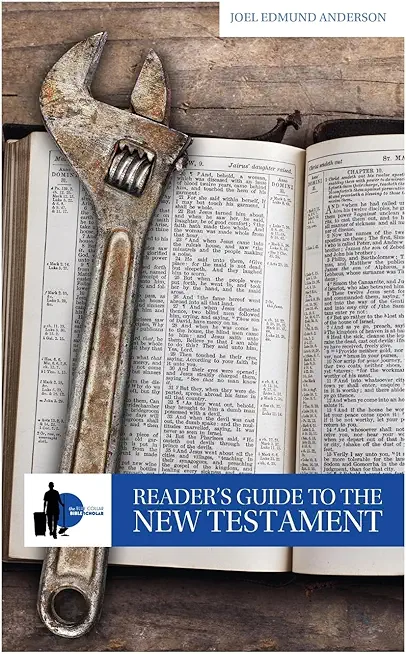
description
er's Guide to the New Testament is the culmination of what Joel Edmund Anderson has taught in his Bible classes at both the high school level and college level over the past 25 years of teaching. As the title suggests, it really is a "reader's guide" to help anyone understand what they're reading in the New Testament.
Most Bible commentaries simply are not aimed at the average, sincere Christian who simply wants to make sense of what he/she is reading. Scholarly works are aimed at scholars that not only tend to focus solely on historical-critical questions and issues, but often fail to read any given biblical book as a unified, literary whole. Simply put, most scholarly works on the Bible give a heavy dose of historical, archeological, and textual information about the biblical text, but they make very little effort to actually read the biblical text and help the reader understand it.
This is where the BCBS Reader's Guide to the New Testament is different. To be sure, Anderson gives enough historical background, both of the New Testament world and each individual New Testament book, so that the reader can get a grasp of the general time period, but his ultimate focus is to help the reader understand the biblical text itself.
He does this by doing a number of things with each New Testament book: 1. He provides a brief explanation of the time of writing and authorship of each book, as is generally accepted in both biblical scholarship and Church Tradition.2. He provides a "Big Things to Know" section that highlights the major themes and literary imagery in each New Testament book. This essentially is a "heads up" to the reader to look out for these themes and images as he/she reads any given New Testament book.3. He provides a "Story Chart" or "Literary Map" of each New Testament book that gives the reader a visual of the overall flow of each New Testament book. This is extremely helpful, in that it helps the reader (a) follow the storyline in books like the Gospels and Acts, and (b) trace the argument that is being made in each New Testament letter.4. He then provides a "walkthrough" of each New Testament book, passage by passage, helping the reader understand how each New Testament book fits together as a coherent whole. 5. Finally, in the corresponding BCBS Reader's Guide to the New Testament Workbook, Anderson provides study/discussion questions for the reader as he/she reads through each book in the New Testament. The workbook can be used in individual study, a Sunday School or Bible Study small group, or a high school Bible class.
Most Bible commentaries simply are not aimed at the average, sincere Christian who simply wants to make sense of what he/she is reading. Scholarly works are aimed at scholars that not only tend to focus solely on historical-critical questions and issues, but often fail to read any given biblical book as a unified, literary whole. Simply put, most scholarly works on the Bible give a heavy dose of historical, archeological, and textual information about the biblical text, but they make very little effort to actually read the biblical text and help the reader understand it.
This is where the BCBS Reader's Guide to the New Testament is different. To be sure, Anderson gives enough historical background, both of the New Testament world and each individual New Testament book, so that the reader can get a grasp of the general time period, but his ultimate focus is to help the reader understand the biblical text itself.
He does this by doing a number of things with each New Testament book: 1. He provides a brief explanation of the time of writing and authorship of each book, as is generally accepted in both biblical scholarship and Church Tradition.2. He provides a "Big Things to Know" section that highlights the major themes and literary imagery in each New Testament book. This essentially is a "heads up" to the reader to look out for these themes and images as he/she reads any given New Testament book.3. He provides a "Story Chart" or "Literary Map" of each New Testament book that gives the reader a visual of the overall flow of each New Testament book. This is extremely helpful, in that it helps the reader (a) follow the storyline in books like the Gospels and Acts, and (b) trace the argument that is being made in each New Testament letter.4. He then provides a "walkthrough" of each New Testament book, passage by passage, helping the reader understand how each New Testament book fits together as a coherent whole. 5. Finally, in the corresponding BCBS Reader's Guide to the New Testament Workbook, Anderson provides study/discussion questions for the reader as he/she reads through each book in the New Testament. The workbook can be used in individual study, a Sunday School or Bible Study small group, or a high school Bible class.
member goods
No member items were found under this heading.
Return Policy
All sales are final
Shipping
No special shipping considerations available.
Shipping fees determined at checkout.







